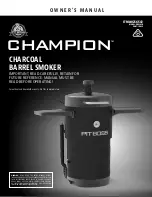
Glossary
Active:
Uses electrical power.
Amplifier:
An electronic device that increases the cur-
rent and/or voltage of a signal, providing power to the
loudspeakers (i.e. power amplifier, integrated amplifier,
receiver).
Bass:
The range of audio frequencies below 180Hz,
characterized by low pitch.
Crossover:
An electronic circuit that divides an audio
signal into different frequency ranges.
Distortion:
Any deviation from the original signal.
Driver:
The moving part of a loudspeaker, which radiates
sound energy.
Dynamics:
Variations in loudness of sound.
Frequency:
A rate of vibration, which corresponds to
musical pitch, expressed in Hertz (Hz).
Full Range:
A signal encompassing the entire audible
frequency spectrum.
Hertz (Hz):
A unit equal to one cycle per second, used to
measure the frequency of a signal or sound.
High-Pass Filter:
A filter that passes only high frequen-
cies above a lower limit.
Impedance:
A measure of the total opposition to current
flow in an alternating current circuit, measured in ohms.
In Phase:
The polarity of an audio signal when connect-
ed as follows: (+) to (+) and (-) to (-).
Integrated Amplifier:
A preamplifier and amplifier built
into one chassis.
Interconnect Cable:
A length of shielded wire with plugs
at both ends for feeding signals from one electronic
device to another.
L.F.E.:
"Low Frequency Effects"; The .1 channel of infor-
mation recorded on most multichannel digital sound for-
mats.
Line-Level Connection:
Low level RCA/phono or XLR
type connection.
Load:
A term used to describe the impedance that a
speaker presents to an amplifier.
Low-Pass Filter:
A filter that passes only low frequen-
cies below a higher limit.
Main Speakers:
Front L & R channel speakers, some-
times referred to as satellites.
Main-In:
A line-level RCA/XLR power amplifier input on
To legally install cable TV or a DSS system, there must
be a ground conductor from the dish or cable tied to the
earth outside of the building. This guarantees that if
struck by lightening, the current will flow to ground (earth)
outside of the building, never endangering someone’s life
inside or damaging any equipment. Removing the
ground from the DSS or cable system is not a legal or
moral option. We use a grounded power cord on our
powered subwoofers and amplifiers to ensure that the
customer is always safe. If there is ever any internal
short in the subwoofer amplifier between the power sup-
ply and the chassis, the current will be shunted to ground
(earth) through the power cord and the fuse will blow.
The customer will never be in any danger of electric
shock.
The proper way to break the ground loop in the system
is to do it at the signal level. This should be done at the
output of the device that is causing the ground loop. In
this case it is the DSS or cable system. The best way to
do this is with a ground loop isolator. A good one is avail-
able from Jensen Transformers.
Jensen Transformers, Inc.,
7135 Hayvenhurst Ave.
Van Nuys, CA 91406
Voice: (818) 374-5857 Fax: (818) 374-5856
www.jensen-transformers.com
Part# VRD-1FF Retail cost of $59.95
If these steps don't restore the Ten or Twelve to
operation, contact your local Authorized NHT Dealer or
NHT for assistance.
Satisfaction
Your satisfaction with your new NHT Ten or Twelve
Subwoofer is important to us. Please note the matched
products and accessories we provide for them, and your
warranty, printed on the back of this manual. If you have
any questions regarding your speakers' use, feel free to
call NHT at 1-800-NHT-9993. Enjoy your listening and
viewing!





























